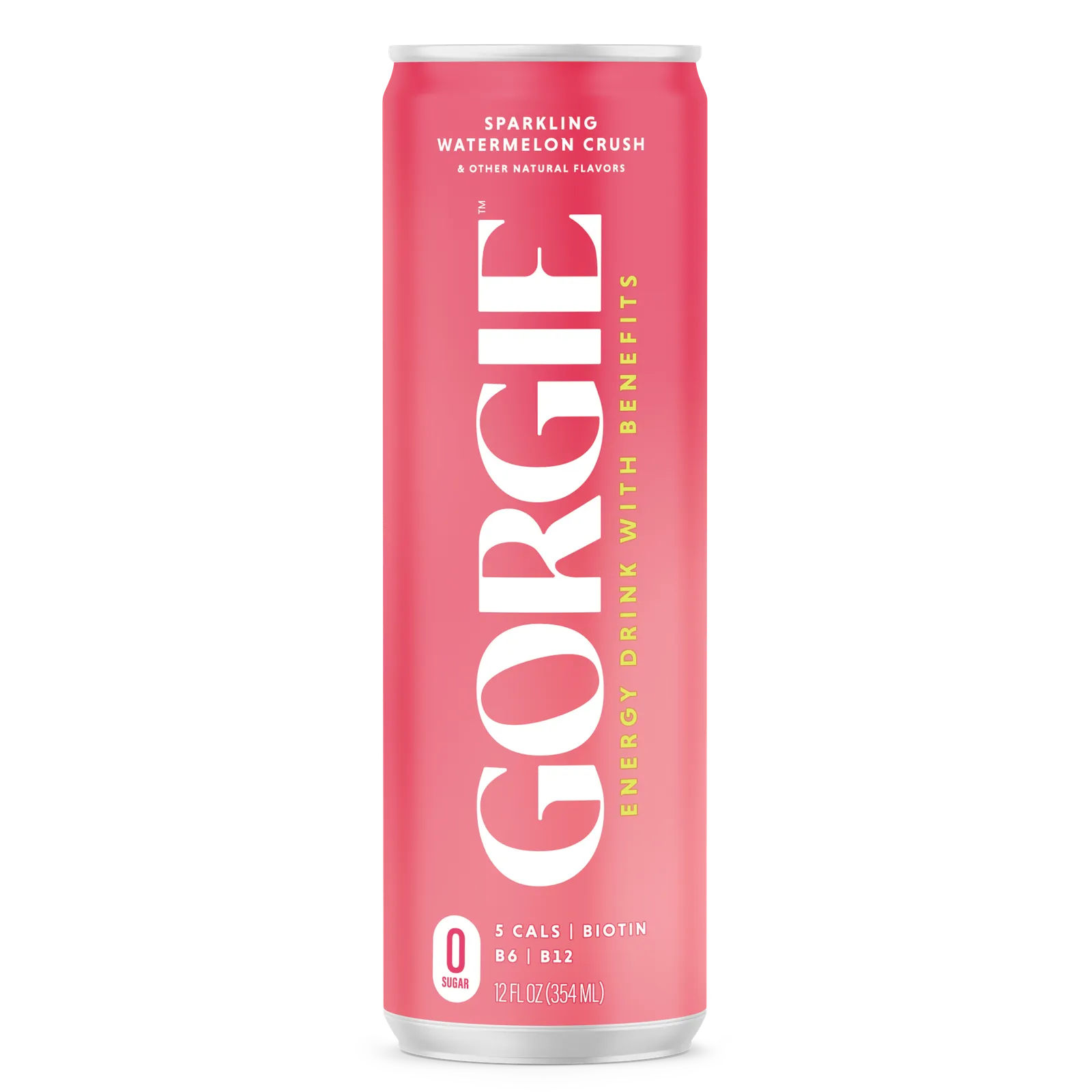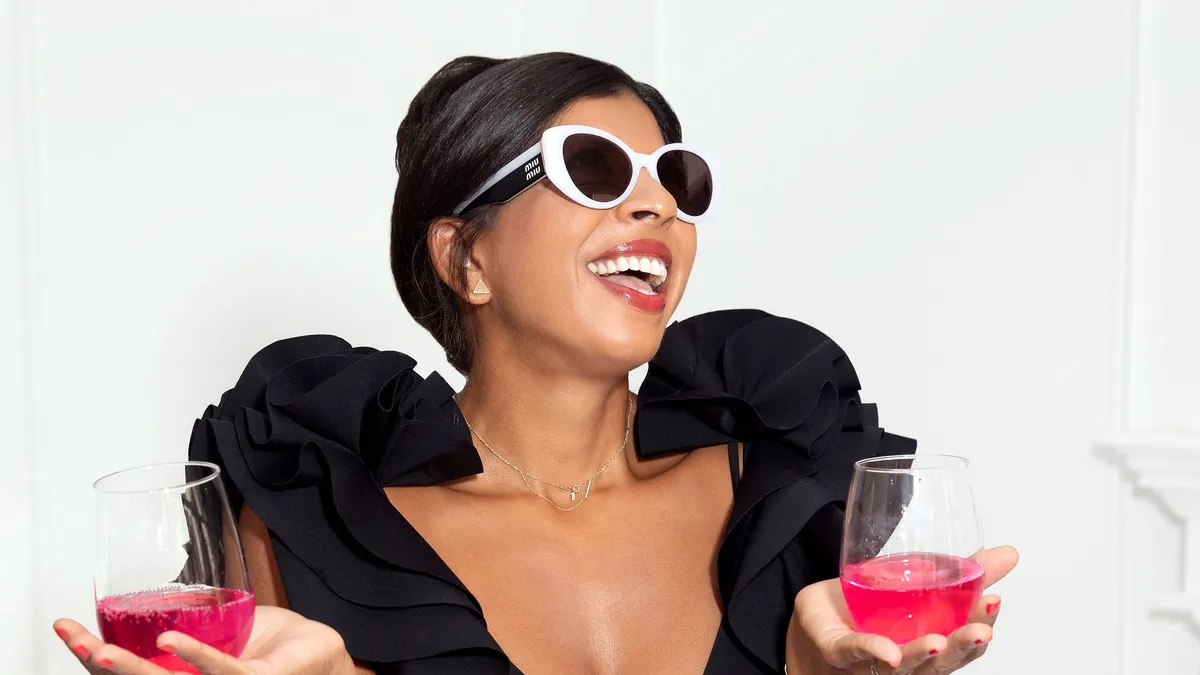The beverage category seems to have more newcomers than ever before.
Globally, the beverage market is expected to reach $223 billion this year with an annual growth rate of about 12.39% through 2027, according to data from Statista. The functional beverage category — which Allied Market Research data defines as drinks containing nontraditional ingredients marketed to provide additional health benefits — is expected to register a 5.9% compound annual growth rate from 2021 to 2030.
Fresh brands marketed to a younger audience — such as Olipop, Ghia, Kin Euphorics, Amass and Poppi — are all trying to take a slice of the soda and alcohol categories where old-school companies dominate. And where some of the long-standing drink brands infamously lack nutritional value, many of these newer names market themselves on including more unique health benefits (such as prebiotics, apple cider vinegar, adaptogens, lower sugar content and zero alcohol).

Michelle Cordeiro Grant’s new energy drink, Gorgie, is a reflection of this trend. It is a caffeinated drink with supplements such as B6, B12, L-Theanine and biotin. The brand’s bright colors and editorial-like imagery are in stark contrast to other energy drinks that come in darker shades and sponsor athletes in sports leagues such as the UFC.
Gorgie launched into Whole Foods last month, and Cordeiro Grant — founder of direct-to-consumer lingerie brand Lively — spoke with Retail Dive about her quick move into beverages and how she views direct-to-consumer channels.
From bras to beverages
Cordeiro Grant founded Lively in 2015, and sold it just four years later to lingerie giant Wacoal International for $105 million. The brand emphasized inclusion under her, and she will remain in a founder position with Lively until March.
Leaving Lively was a difficult decision for Cordeiro Grant, but she says she recognized the need for a different type of leadership as the brand had grown drastically since its inception.
“When I finally picked up my head in 2022, I realized this is like an organization similar to the size of when I was in corporate America,” Cordeiro Grant told Retail Dive. “I had a lot of self-reflection where it was the first time that what I wanted as a human and what Lively needed as a company were different ... I wanted to go back to building.”
So why jump into energy drinks? For Cordeiro Grant, the move came from her personal experience with wellness during the COVID-19 pandemic and an urge to start something new.
“I started to get my wheels turning again,” she said. “And wellness, the thing that struck me is that I saw so much of it during the pandemic. I was taking different supplements and eating well. ... But everything that I was consuming didn't really taste good or look good, and all the marketing felt so serious.”
The original concept she came up with was to create a powder or candy that would combine the daily supplements Cordeiro Grant was taking. However, she pivoted the product form after surveying potential customers.
“When I started to survey my community through Google Forms and docs, I kept coming back to beverage,” she said.
Cordeiro Grant combined that input with observations she gleaned from a trip to Florida later on.
“I see these beautiful humans, they spent all day getting their outfit and skin ready, holding these cans of Red Bull, Celsius, Monster, Bang,” she said. “The cans just don’t go with their look. And that's when it dawned on me. Everybody is wanting energy, but if I made it healthier, if I combined wellness with it and put it in a venue that really gives it credibility in terms of being better for you, then this could be big.”
In August, she quickly started developing what would become Gorgie, and it launched officially in January through an e-commerce website and at a Whole Foods location in New York City.
The fast road to wholesale
Gorgie’s emphasis on health benefits is what Cordeiro Grant says attracted a grocery store like Whole Foods.
“We were very lucky that Whole Foods showed interest in this concept very early on,” she said. “You don't find really any energy drinks in Whole Foods because most energy drinks use ingredients that are not allowed, whether it's erythritol or aspartame. All these things that are in typical energy drinks, we created Gorgie without.”
Cordeiro Grant says the brand is also being rolled out to more locations across New Jersey and Connecticut. However, Gorgie isn’t ignoring its DTC channel as it expands through wholesale.
“It's like they're twins,” she said. “We're feeding them both at the same time. ... DTC is super interesting, because we are so socially native on TikTok and Instagram. TikTok is very important. It's the top of the funnel for us.”
Taking some lessons from her work at Lively, Cordeiro Grant says she’s learned to embrace imperfection through creating Gorgie and is focused on growing at the right pace.
“I think this second time around, I’m so much more patient. We came up with this concept in August and we went to the shelves of Whole Foods in January. There was no chance I could be perfect at any step of this,” she said. “When people see something like this, they love it and they want their hands on it immediately. It's really important for us to make sure that we get our footing, we understand the flavors that people love and then move really quickly. And so what keeps me up at night is just balancing that pace.”
























